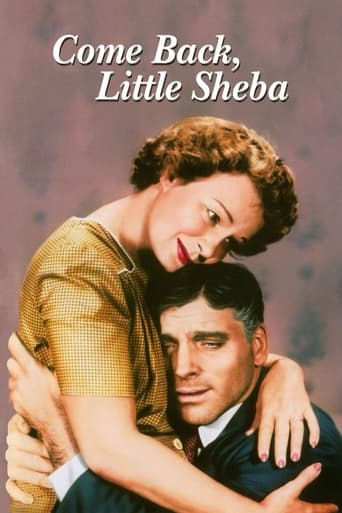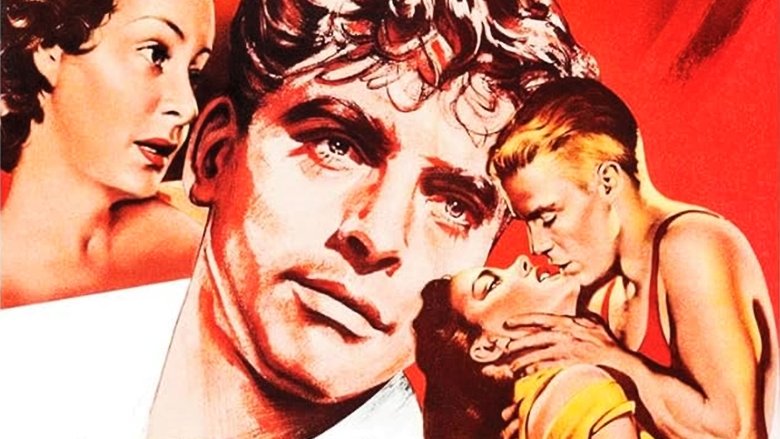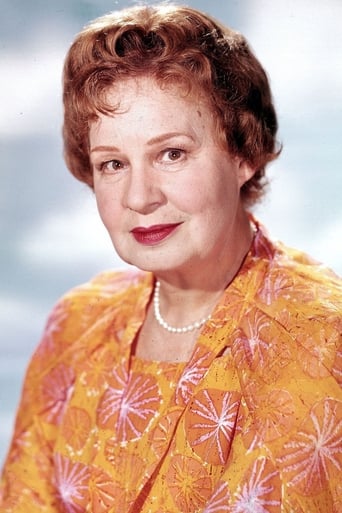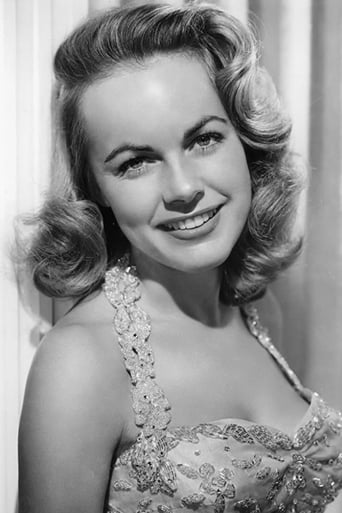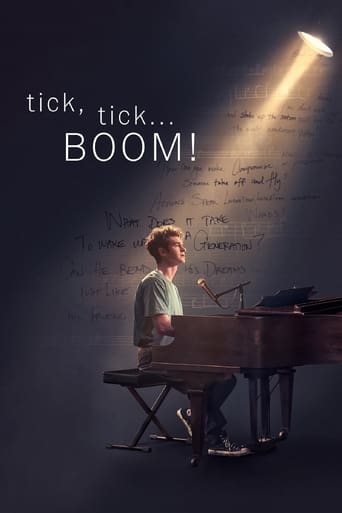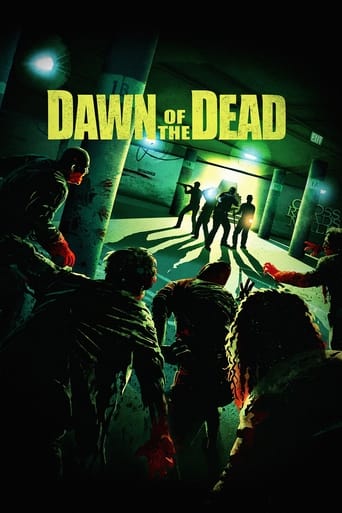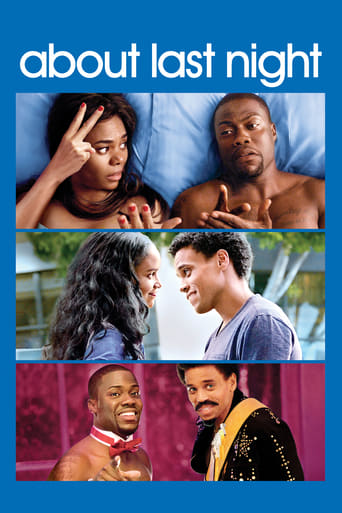Come Back, Little Sheba (1952)
A mismatched couple's marital problems come to the surface when the husband develops an interest in their pretty boarder.
Watch Trailer
Free Trial Channels
Cast


Similar titles
Reviews
A different way of telling a story
Great example of an old-fashioned, pure-at-heart escapist event movie that doesn't pretend to be anything that it's not and has boat loads of fun being its own ludicrous self.
A terrific literary drama and character piece that shows how the process of creating art can be seen differently by those doing it and those looking at it from the outside.
While it is a pity that the story wasn't told with more visual finesse, this is trivial compared to our real-world problems. It takes a good movie to put that into perspective.
Playright William Inge had something of a penchant for the catalyst, employing them to good effect in Picnic, Bus Stop and, of course, in this play. Whilst Tennessee Williams is arguably a better dramatist he doesn't always translate to the screen as well as Inge who had four solid successes with the three mentioned above plus The Dark At The Top Of The Stairs, even Ted Williams didn't hit like that. It is, of course, Shirley Booth - in her film debut - who carries the film though Burt Lancaster is solid in support playing much older than his real age. Trivia buffs will relish the fact that Humphrey Bogart lobbied for the part of Doc and was nearer to the correct age than Lancaster; this is only trivia if you know that Booth made her stage debut in 1925 opposite Bogie. This is a fine film that stands up well after more than sixty years.
Daniel Mann's director debut, a screen adaptation of William Inge's eponymous play debuted in 1950, stage thespian Shirley Booth reprises her Tony-winning role in the movie, which not only marks her screen debut at the age of 54, but wins her a coveted BEST LEADING ACTRESS Oscar too.Lola Delaney (Booth) is a middle-aged housewife, her life seems to be on the right track except that her little puppy Sheba has disappeared several months ago, his husband Doc (Lancaster), a former alcoholic, has been sober for a whole year, which is something worth celebrating in the AA meeting, and now she finds a new boarder, an attractive college student Marie Buckholder (Moore), who seems to be quite open-faced and spirited to move in immediately. The Delaneys have no child, although later it will reveal that they had a stillborn baby years ago, thus the presence of Mary instantly gingers up their quiet life, Lola grows maternal towards her, and is more than happy to condone Mary's flirtation with the jock Turk Fisher (Jaeckel), although she has a fiancé; but for Doc, the youthful Mary becomes a pernicious symbol of temptation, he disparages Turk and struggles with his own impulse towards her, even though the latter only views him as an avuncular elder.We all know at one point, Doc will have a relapse of his addiction for his sexual frustration, but the set-up of the climax, where Doc whisks away a bottle of Whiskey surreptitiously, then returns with another bottle to cover it, is a cheap move, considering there is no hurdles for him to access liquor, why he has to take the only bottle in their home, instead of buying one outside? The only purpose is to let Lola discover the fact that the bottle is missing, hence it ruins the big day for her, she is organising a home dinner for Mary and her fiancé, that's a script loophole which could be avoided if the screenwriter were more considerate. But, the climax is a hallmark collision of two engrossing performers.Booth is such an unforced and compelling actor, her portrayal of Lola as the salt of the earth, is so full of vigour, accuracy and sympathy-inducing, a good-hearted woman who is whole-heartedly devoted to her husband, kind to everybody else, occasionally enjoys a little dancing on the radio, a little concerned about her past and doesn't minces words about her real feelings and thoughts. Although she has a very traditional view on how to be a competent wife, when she comments that women must pose naked but men don't have to for life class, she is certainly not a dyed-in-the- wool conservative. It is so extraordinary that a woman in her age can be granted with such a richly written role to play, where in sharp comparison, nowadays, few paymasters are willing to green- light a project focused on the kitchen-sink drama of an ordinary woman over 50.Lancaster, who is 15-years younger than Booth, does seem to be an odd choice to play Doc, he maximally downplays his discernible charisma and charges a poignant gravitas entrapped in his own misery and weakness, but in our eyes, he is much dapper than the ostentatious Turk to win the attention of Mary. Terry Moore, whose private life is far more splendid than her acting career, is the lucky one to be nominated for an Oscar, where her part merely functions as an unwitting stimulus to trigger the declining of Doc's state, and most of the time, she is too dumb to know what she really wants.
One thing for sure—the film certainly goes against the glamorous 50's mold. Probably no movie from that prettified period is as dour as this one, from the dowdy Lola to the grim- faced Doc to the bleak photography to the plebian sets. I kept yearning for lively little Marie (Moore) to bounce in and give my eyes some relief. My guess is Hollywood was out to show Broadway that they could entrust their Meaningful stage plays to the notoriously commercial West Coast.Sure, Booth gets the spotlight and responds by emoting like she's on New York's center stage. But with that whiny voice and desperate demeanor, she's more pathetic than sympathetic. Then again, that may be the point, but you've got to wonder why the hunky Doc (Lancaster) stays with her in about as egregious a piece of visual miscasting as I've seen. But then maybe he too pities her long lost youth that won't ever come back no matter how hard she yearns. Looks like they're both paying a price for a mistake made years earlier. Of course, as might be expected, the screenplay's loaded with symbolism, especially her "dream" soliloquy. So get out your Freud if you care to.In my little book, the movie amounts to a one woman show that hasn't worn well, despite the studio's good intentions. Then too, catch that pat, unconvincing ending, so typical of the time. The dour production, however, does manage to put a dent in the bosomy Technicolor spectacles that ruled the 50's Hollywood roost. I'm just glad the talented Booth eventually moved on to TV and the less stagy Hazel (1961-1966).
She talks too much, she's sloppy, she spends her days longing for her lost puppy, her lost youth, and the fantasy worlds portrayed on daytime radio. Why is it, then, that my heart aches for Lola Delaney? In part, because playwright William Inge understands the loneliness and repression that afflict many ordinary lives, but mostly because Shirley Booth brings Lola so vividly to life.There is much not to like in this film, starting with the miscasting (widely noted by reviewers) of Burt Lancaster as Lola's husband Doc. In spite of the gray touch-up at his temples, Lancaster looks too young, strong, and vigorous to be Lola's husband, let alone a recovering alcoholic.Also out of place in this story are the young people, played by Terry Moore and Richard Jaeckel, who get a lot of screen time. While Lola and Doc are complex characters that one takes seriously, Marie and Turk are stereotypical older teens. Terry Moore's character is, however, something of a tease, which may be why she was nominated for a supporting actress Oscar.Another problem is the ending, with its abrupt shift to a more hopeful outlook, with Lola changing her ways and Doc suddenly tender--this after chasing after her with a kitchen knife a few weeks earlier.Nevertheless, the film is well worth seeing--for Shirley Booth.

